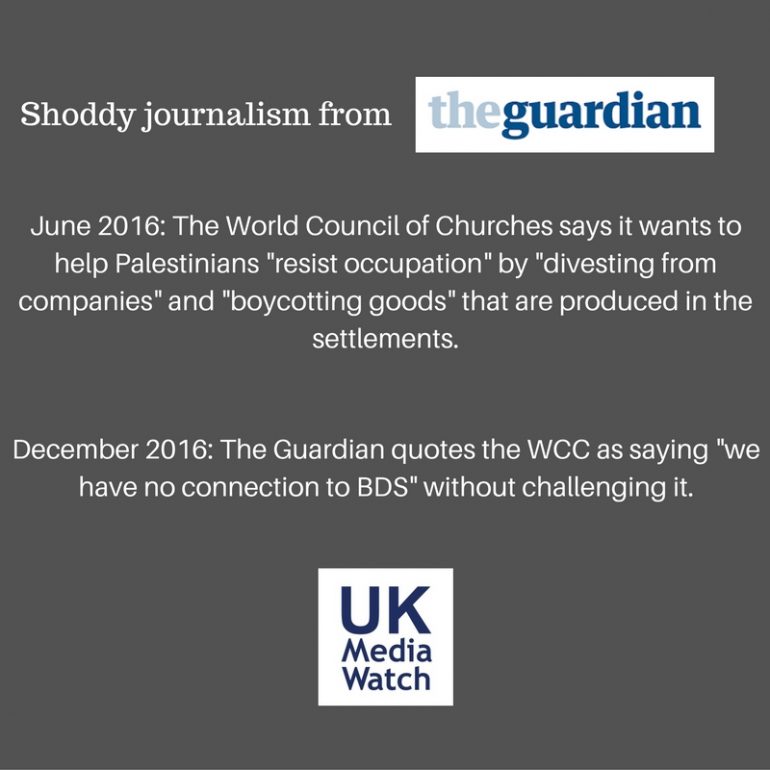A Guardian report by their Jerusalem correspondent Peter Beaumont (Israel refuses visa to theologian over boycott and divestment activism, Dec. 7th) focused on a World Council of Churches (WCC) official from Malawi who was denied entry into Israel due to her BDS activism.
WCC, an umbrella organisation for 349 Protestant and Orthodox churches in 110 countries, has brought more than 1,500 pro-Palestinian volunteers to the West Bank since 2012 to “witness life under occupation” and “act against injustices”. This program is administered through a group WCC established called Ecumenical Accompaniment Programme in Palestine and Israel (EAPPI).
NGO Monitor’s profile on WCC (and its sub-groups) includes evidence that they don’t merely advocate for Palestinians, but often use demonising rhetoric about Israel, including the false charge of “apartheid”. WCC also has used language suggesting that they’re sympathetic to Palestinian terrorism. Though they claim to reject violence, in a joint statement with another church group, they declared that Israel “cannot keep an entire people subject to pressure and violence for many years and not expect a violent reaction.”
Beaumont’s Guardian report includes this quote from a WCC spokesperson:
Speaking to the Guardian, [Olav Fykse Tveit, the general secretary of the WCC] said that far from working to delegitimise Israel, the WCC had recognised Israeli statehood in 1948, regarded “antisemitism as a sin” and had no connection to BDS.
However, the watchdog group NGO Monitor reports that WCC (largely through sub-groups like EAPPI) plays a big role “in mobilizing churches worldwide to support international BDS campaigns”.
CAMERA Christian Media Analyst Dexter Van Zile – in a Twitter exchange on Dec. 6th with the WCC Director of Communications, Marianne Ejdersten – refuted the specific claim that WCC has “no connection with BDS”.
https://twitter.com/dextervanzile/status/806330197997973505
Van Zile linked to a 2005 WCC document from their Executive Committee recommending “an international boycott of goods produced in illegal settlements on occupied territory”. Further, as recently as June 2016, the WCC issued a statement which included support not only for boycotting settlement goods, but also for supporting BDS against any company which “profits” from the occupation – an extremely broad category which could arguably include almost any Israeli business.
Against all the pressures of desperation, provocation and incitement to violence, the WCC has sought to encourage and accompany Palestinian people and communities, and member churches and partners throughout the world, in their efforts to resist occupation, including through economic measures such as divestment from companies profiting from the occupation and boycotting goods produced in illegal settlements on occupied territory.
If the Guardian journalist had done some fact checking, he would have easily found such evidence clearly contradicting the WCC spokesperson’s claims that they have “no connection to BDS”.



